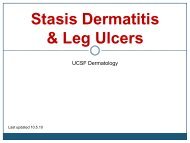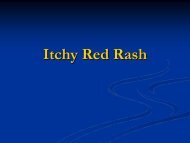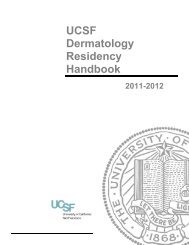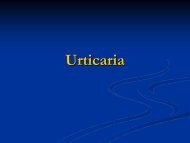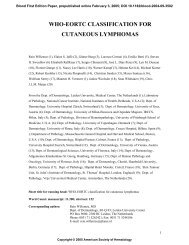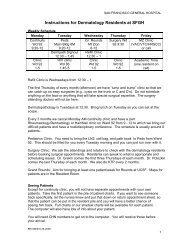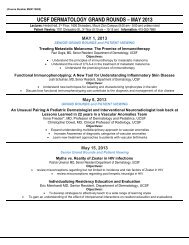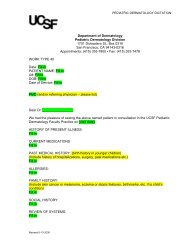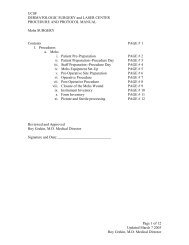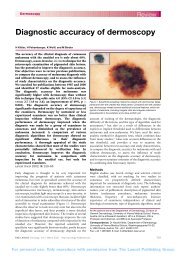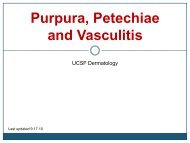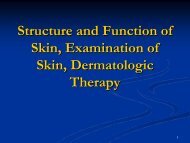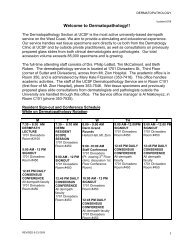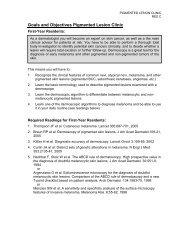An overview of sexually transmitted diseases. Part III ... - Dermatology
An overview of sexually transmitted diseases. Part III ... - Dermatology
An overview of sexually transmitted diseases. Part III ... - Dermatology
Create successful ePaper yourself
Turn your PDF publications into a flip-book with our unique Google optimized e-Paper software.
J AM ACAD DERMATOL<br />
VOLUME 43, NUMBER 3<br />
Acyclovir, valacyclovir, and famciclovir are recognized<br />
by the CDC as appropriate therapies for primary<br />
or recurrent genital herpes in the HIV-infected<br />
patient. 1 As in the immunocompetent patient, therapy<br />
should start as soon as possible, preferably during<br />
the prodromal period. Therapy is then continued<br />
until clinical resolution is obtained. 1 For acyclovir<br />
and famciclovir, increased dosages above those recommended<br />
for immunocompetent persons may be<br />
required. For example, whereas the recommended<br />
oral dose <strong>of</strong> acyclovir is either 400 mg 3 times per<br />
day or 200 mg 5 times per day, regimens <strong>of</strong> 400 mg<br />
given 5 times per day have been useful in immunocompromised<br />
patients. 1 Likewise, famciclovir 250<br />
mg twice daily is recommended for suppression <strong>of</strong><br />
genital herpes in the immunocompetent person, but<br />
500 mg twice daily has been effective in decreasing<br />
both the rate <strong>of</strong> recurrences and the rate <strong>of</strong> subclinical<br />
shedding among HIV-seropositive persons. 47<br />
When given at doses <strong>of</strong> 8 g per day to markedly<br />
immunocompromised persons for suppression <strong>of</strong><br />
cytomegalovirus infections, valacyclovir was associated<br />
with either thrombotic thrombocytopenic purpura<br />
or the hemolytic uremic syndrome. 1,48,49 However, no<br />
cause-and-effect relationship was ascertained. When<br />
taken as a dose <strong>of</strong> 500 mg twice daily, valacyclovir<br />
appeared safe and effective for the suppression <strong>of</strong><br />
genital HSV in HIV-seropositive persons and was<br />
superior to acyclovir 400 mg twice daily. 50 Therefore<br />
acyclovir, valacyclovir, and famciclovir all appear useful<br />
for treatment and suppression <strong>of</strong> HSV in immunocompromised<br />
persons. 47-55<br />
Interestingly, acyclovir treatment <strong>of</strong> HSV infections<br />
in HIV-positive patients may <strong>of</strong>fer a significant<br />
survival benefit. Eight randomized controlled trials,<br />
combined in a meta-analysis, showed that patients<br />
treated with acyclovir had a significant survival<br />
advantage compared with those who went untreated.<br />
51 Two multicenter clinical trials noted that<br />
patients given acyclovir and zidovudine lived longer<br />
than those given only zidovudine. 56,57 These studies<br />
suggest that long-term suppressive acyclovir therapy<br />
prolongs survival in AIDS patients with extensive histories<br />
<strong>of</strong> HSV infections.<br />
The mechanism by which this occurs is unclear.<br />
Studies demonstrate that acute or reactivated HSV<br />
infection may stimulate HIV replication. 58-60<br />
Furthermore, Mole et al 61 documented increased<br />
plasma HIV viral loads in HIV patients experiencing<br />
an outbreak <strong>of</strong> HSV. By reducing or attenuating<br />
the occurrences <strong>of</strong> HSV outbreaks, acyclovir therapy<br />
may help reduce these deleterious effects <strong>of</strong><br />
the infections. Clearly, further investigation<br />
regarding this issue is required, as evidenced by<br />
the study <strong>of</strong> Gallant et al, 62 which found no asso-<br />
Czelusta, Yen-Moore, and Tyring 411<br />
Fig 1. HIV-positive patient. Large suprapubic ulcer due to<br />
HSV type 2.<br />
ciation between survival and acyclovir use in HIVinfected<br />
patients.<br />
A preliminary report from the CDC noted that<br />
6.4% <strong>of</strong> HSV isolates from 140 HIV-positive patients<br />
were resistant to acyclovir compared with less than<br />
1% <strong>of</strong> isolates from immunocompetent persons. 63<br />
Typically, resistance to acyclovir is also associated<br />
with resistance to the other thymidine kinase<br />
inhibitors. Resistance rates before the advent <strong>of</strong><br />
these medicines appear similar to those currently<br />
seen in the population. Resistance does not appear<br />
to be increased or induced by long-term suppressive<br />
therapy with these medications. 64 In contrast, the<br />
increased HSV acyclovir-resistance rates seen in HIVpositive<br />
patients may reflect the increased replication<br />
<strong>of</strong> HSV in these patients; therefore resistance<br />
may actually be reduced by long-term suppressive<br />
thymidine kinase inhibitor therapy. 65<br />
Resistance to acyclovir may be mediated by mutations<br />
in either the HSV thymidine kinase or HSV<br />
DNA polymerase genes with decreased substrate<br />
affinity or by decreased or absent production <strong>of</strong> the



